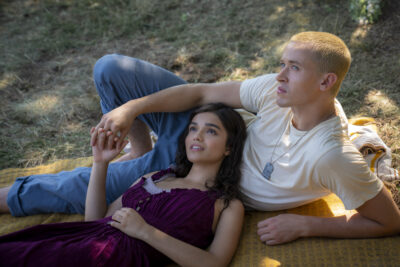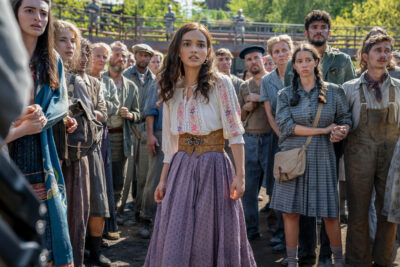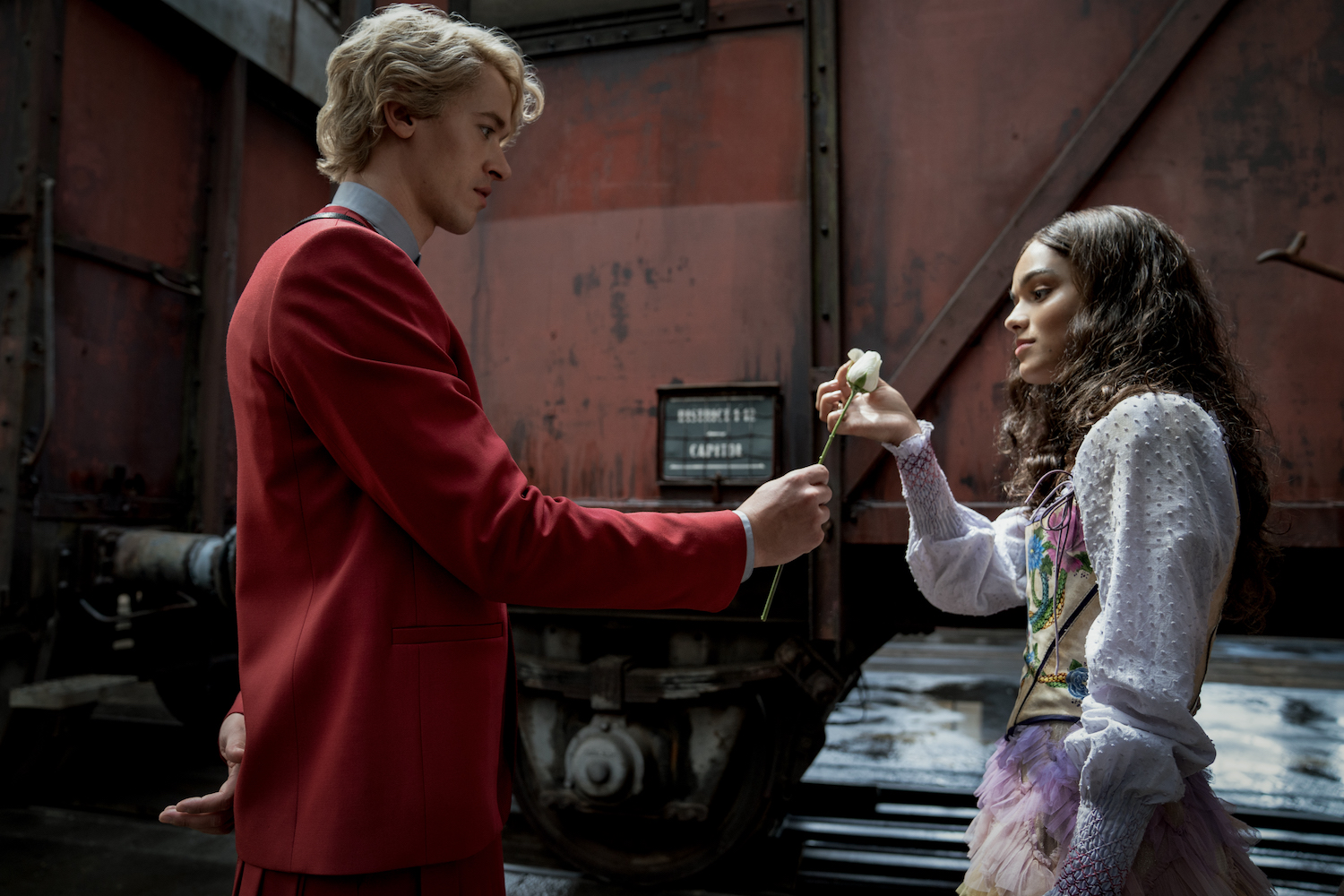The Ballad of Songbirds and Snakes has pulled off a rare feat for a prequel: to feel just as high-stakes as the originals, with familiar elements incorporated into a fresh and thrilling story, introducing us to a new cast of distinct yet equally beloved characters.
The heart-pounding prequel to The Hunger Games franchise marks a return to the dystopian world of Panem, set in the shadow of war and only a decade after the first Hunger Games. The story follows a young Coriolanus Snow (Tom Blyth). Striving to lift his family out of poverty, and tasked with renewing the public’s interest in the Hunger Games, he becomes a mentor to Lucy Gray Baird (Rachel Zegler), a feisty performer chosen as District 12’s female tribute. Coriolanus and Lucy Gray influence each other’s fates both in and out of the arena as they are pulled between forces of good and evil, and Snow begins to evolve into the tyrannical President from the original series.
Producer Nina Jacobson, who also produced the original four Hunger Games films alongside director Francis Lawrence, tells us that the opportunity to re-enter the world of Panem came as a surprise. “After we finished the last Mockingjay, we really felt like this was the end of the road,” she says. “So the surprise of finding out that in fact, Suzanne had been working on a new book and we were going to get to come back together again, was an incredibly thrilling phone call to get.”

In the early 2010s, The Hunger Games burst onto the scene, becoming a global phenomenon. The film franchise grossed $1.45 billion domestically and more than 100 million copies of Suzanne Collins’ beloved books have been sold worldwide. The series drew in a large and dedicated teenage fanbase, and for many who grew up with the franchise, devouring the books and anxiously waiting for a new installment in the film series each November, the release of The Ballad of Songbirds and Snakes comes with a heavy dose of nostalgia.
I was one of those teenagers, and knowing how powerfully these stories can resonate, I was eager to ask Jacobson about the strong connection that so many seem to have with The Hunger Games. “I love that it still means so much to the people who grew up with it. That means a lot to me,” she says. Part of this, she adds, is how so many people could identify with the protagonist at the heart of the story.
“It amazes me actually— and I am continually awestruck—representation is everything. People look up and see someone who they admire and aspire to be, particularly a young woman who changes the world,” Jacobson says. “At a time when people are looking to see themselves and to see what their own possibilities might be, there is something super powerful about seeing a character like Katniss.”
A whole generation of young people identified with the quiet strength, fierce loyalty, and rebellious spirit of Katniss Everdeen. From 2013 to 2014, at the height of The Hunger Games’ popularity, participation in archery rose 86% according to one study, with women’s participation increasing 105%. Nearly half of teen girl respondents said Katniss influenced their decision to pick up a bow and arrow. Amidst the insecurities, uncertainties, and often painful self-discovery of adolescence, teens were identifying with Katniss, a young woman also trying to find her place in the world.
Jacobson is a veteran in the film world, with blockbuster titles like Crazy Rich Asians, The Goldfinch, and Diary of a Wimpy Kid under her belt. She tells me that earlier in her career, she would witness significant pushback against having a woman at the center of a story.
“When I was coming up in the business, I was told that girls will identify with a male protagonist, but boys will not identify with a female protagonist. That’s the way it works. Of course, it’s strange that that was expressed exclusively by boys as the way it works. That works out well for you. It doesn’t work out that well for us.”

While The Ballad of Songbirds and Snakes follows Coriolanus Snow’s journey, Lucy Gray Baird is an equally fascinating lead, often stealing the spotlight with her mysterious charm and of course, her captivating musical performances.
Jacobson says that she and Lawrence knew music would be integral to the story, but they were nervous about how the musical segments of the film would be perceived. Music was already heavily woven into the original series—the unmistakable four-note whistle from the districts, the lullaby that Katniss would sing to her little sister Prim—but intentionally getting up on a stage to sing— that was completely new territory for a Hunger Games character.
“It was daunting, because we felt like, if you blow it, you’re done for. What if people laugh when someone starts to sing in the movie?”
But just as Lucy Gray captured the hearts of Capitol audiences in the film, Rachel Zegler played her with a unique magnetism that made the music feel authentic, managing to blend performances of both chilling ballads and lively folk songs into the world of The Hunger Games naturally and effortlessly.
“The music moved me when I heard it,” says Jacobson. “To have a character like Lucy Gray, who you cannot take your eyes off when she’s singing, and to have someone like Rachel who can do that, is really a rare talent.”

So, why now? What is the impact of a return to The Hunger Games in the context of today’s world? Could some of this nostalgia for the series be tied to not only a simpler time in our own lives, a time of self-discovery and rebellion, but also to a slightly simpler time in the world?
The first Hunger Games book was published in 2008, and the first film was released in 2012. By the time The Ballad of Songbirds and Snakes was published in 2020, the world looked very different, but some of the core themes— rebellion against authoritarian governments and oppressive systems—became even more relevant.
“Resistance, defiance, refusal to accept the status quo. We need all of those things desperately,” Jacobson says. “Those ideas feel so contemporary and Suzanne’s ability to integrate them into character and keep you turning pages. It doesn’t feel like it’s about politics. It feels like it’s ultimately about young people figuring out who they are as they are pulled in these sort of competing directions.”
In such charged and polarizing times, with the fragility of democracy on display worldwide, Jacobson says the story of Coriolanus and Lucy Gray highlights the importance of human connection, even where it seems unlikely.
“What I love about this movie, and I think it’s true of the book and true of the original series as well, is that you never actually know what you might share with another person,” Jacobson says. “With social media, which is like a polarization machine in which people are rewarded and congratulated the more polarized they are, we have a story about how you never know what you might share until you look at the other person as a human being, and open yourself to the possibility of connecting.”

As a whole new generation is introduced to The Hunger Games, Jacobson posits that a fascination with how the protagonists grapple with complex moral dilemmas is part of what makes the franchise so impactful.
“[The Hunger Games] is about a person who didn’t plan to be a hero. This is true also of Lucy Gray. They’re people who are thrown into a circumstance and ultimately it comes down to their judgment and their choices and their values. And I think that’s very powerful for people.”
When to speak up, when to stay silent, which battles to fight, navigating moral grey areas, doing the right thing when it’s the hard thing—these are all complex situations younger generations will continue to face as the world becomes more polarized— so it’s no surprise they feel an affinity with characters wading through the same waters on screen.
The Hunger Games: The Ballad of Songbirds and Snakes is in theatres now.



 Follow Us On Instagram
Follow Us On Instagram
